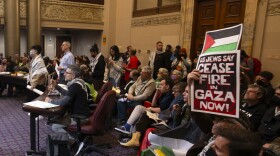RENEE MONTAGNE, host:
The collapse of Bernard Madoff's investment operations in December left a long string of victims. For these investors, one of the most painful parts of that case is that it might've been avoided if regulators had heeded the warnings of the likes of Harry Markopolos. He's a private fraud investigator who was an executive in the securities industry when he said years ago that Madoff was operating a house of cards. Yesterday, he told a Congressional committee how he tried to tell the Securities and Exchange Commission about Madoff and was repeatedly rebuffed.
NPR's Jim Zarroli reports.
JIM ZARROLI: Markopolos was the chief investment officer of a Boston firm called Rampart Investment Management. He says he was asked by his boss in the late 1990s to try to match Bernie Madoff's returns. His funds seemed to earn steady returns, regardless of market conditions.
Markopolos says he very quickly concluded that Madoff's returns were impossible. He set about proving it, and he took the evidence to the Securities and Exchange Commission.
Mr. HARRY MARKOPOLOS (Private Fraud Investigator): I told the SEC exactly where to look, providing them with a long series of clear warnings that any trained investment professional would've immediately understood. Inexplicably, the SEC never acted upon those repeated multiple warnings over a nine-year time span.
ZARROLI: Markopolos told the House Financial Services Subcommittee that a couple of SEC officials in the Boston office backed his efforts to stop Madoff, but by and large, the agency shut him out, never responding to his warnings.
Mr. MARKOPOLOS: My team and I kept collecting additional information, and I kept sending it to the SEC, and they kept ignoring it.
ZARROLI: Markopolos believes he was thwarted in part by a turf war between the SEC's Boston and New York offices. He also said he believes that SEC officials simply lacked the expertise to understand what was happening.
Mr. MARKOPOLOS: The SEC is over-lawyered and has too few staff with relevant industry experience and professional credentials to find fraud, even when a multi-billion-dollar case is handed to them on a silver platter.
ZARROLI: And there was something else, he said. Markopolos believes that SEC officials were simply afraid of Madoff.
Mr. MARKOPOLOS: Mr. Madoff was certainly one of the most powerful individuals on Wall Street. He had a respected broker-dealer arm. He traded a substantial percentage of the over-the-counter and New York Stock Exchange listed stock volume every day. And they just looked at his size and said he's a big firm, and we don't attack big firms.
ZARROLI: Markopolos was followed in the witness stand by several SEC officials who were called to explain what had gone wrong with the Madoff case. Each one refused to comment on the case itself, saying the investigation was still going on. Instead, they limited themselves to broad remarks about the SEC's mission and its commitment to stopping fraud.
Subcommittee Chairman Paul Kanjorski accused the officials of trying to impede his committee's work.
Representative PAUL KANJORSKI (Republican, Pennsylvania; Subchairman, Financial Services Subcommittee): The lack of cooperation shown in the last several weeks, and I think the abuse of authority or the attempt to bring a protective shield over an executive agency or independent agency of this government, is not acceptable.
ZARROLI: After that, the exchanges grew even more tense. Democrat Gary Ackerman of New York said he was frustrated beyond belief by the testimony from SEC officials. Here, he questioned the SEC's director of enforcement, Linda Chatman Thomsen.
Ms. LINDA CHATMAN THOMSEN (Director of Enforcement, SEC): As I said, we did an investigation in - we began an investigation in 2006, and it was closed without action.
Rep. KANJORSKI: Why was it closed without action? What did you investigation? What methodology did you use?
Ms. CHATMAN THOMSEN: And if you - in the interest of…
Rep. KANJORSKI: Were you suspicious a guy had a one-man accounting firm investigating a $50 billion empire?
ZARROLI: It was Markopolos who emerged as the hero of the hearing. He was hardly the only person who saw through Madoff over the years, but he was the most persistent about turning him in, and committee members hung on his word. And for them, Markopolos had a disturbing piece of news.
He said he's uncovered evidence of at least a dozen more feeder funds that invested with Madoff. He says he's been talking to European regulators about them. And if the information pans out, it means the potential losses from the Madoff case could be even bigger than they now appear.
Jim Zarroli, NPR News. Transcript provided by NPR, Copyright NPR.
NPR transcripts are created on a rush deadline by an NPR contractor. This text may not be in its final form and may be updated or revised in the future. Accuracy and availability may vary. The authoritative record of NPR’s programming is the audio record.





